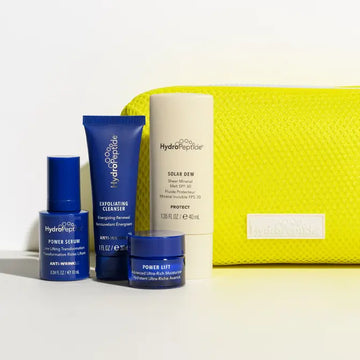
How Do Peptides Help with Skin Ageing? The Science Explained
Share
Ageing can often creep up on us. is sneaky. First the skin stops snapping back quite so fast, then a fine line develops here, a patch of dullness presents there. One day you notice your moisturiser doesn’t seem to work the same way, or your make-up has begun to sit differently on your skin. That’s your collagen and elastin slowly depleting, your skin barrier weakening and your natural renewal processes starting to lag behind.
Yes, skin ageing is normal, but how severe it gets is more controllable than you might think. Sun exposure, pollution, stress, sleep quality, hydration, and your diet can speed up ageing. Which is why supporting the skin early and steadily matters, and why peptides, once considered niche, are now everywhere in skincare.
What Are Peptides?
Peptides are tiny chains of amino acids aka the raw material that builds collagen, and elastin. Without them, skin loses structure. With them, it remembers how to hold itself up.
“They’re essential for firm, youthful skin,” says Director and Medical Practitioner at Dr Raquel Skin & Medical Cosmetics, Dr Raquel Amado. “They serve as messengers that signal the skin to produce more of these structural proteins, helping to improve elasticity, texture, and overall resilience.” What makes them clever is their size. They’re small enough to penetrate the skin’s surface so they can communicate with our cells. Unlike more aggressive ingredients, peptides work steadily, nudging your skin to do what its designed to.
“They offer impressive skin-rejuvenating benefits without the irritation associated with some other actives. And they’re an incredibly versatile broad class of substances, meaning they don’t just do one thing,” adds Aesthetic Doctor and EV Expert Dr Emmaline Ashley.
How Peptides Work
Think of them as quiet instigators. Some peptides work like motivators, encouraging collagen and elastin production. While others behave more like bodyguards, slowing collagen breakdown and protecting the skin barrier.
Different types of peptides target different concerns:
Why Ageing Skin Responds So Well to Peptides
As we age, our natural peptide signals weaken, which is one of the main reasons skinbecomes less firm and resilient. Topical peptides ‘remind’ the skin to stay active, as we age.
“Peptides help maintain the skin's structural integrity,” explains cosmetic chemist at HydroPeptide, Ian Vitek. “This regulatory function is crucial for a variety of skin processes such as wound healing, skin elasticity, and reducing the appearance of fine lines and wrinkles,” he explains.
And because they also strengthen the skin barrier, they help defend against external aggressors like pollution and UV exposure, both key drivers of accelerated ageing. This matters more than ever when you’re trying to slow ageing rather than simply cover up the signs.
HydroPeptide Peptides
At HydroPeptide we don’t rely on a single ingredient to do the heavy lifting. Our formulas layer a range of peptides so they’re working on multiple jobs at once. This results in firmer skin, better texture, brighter tone, and a stronger barrier.
The best anti-ageing HydroPeptide products
How to Use Peptides Effectively
Peptides thrive on routine. They don’t need a complicated set-up, just consistency, making a serum layered under a good moisturiser all you need to start seeing the shift. Add an eye treatment, something targeted for the neck, and daily SPF, and you’ve built a solid anti-ageing foundation.
However, keep in mind that, “peptides don’t provide immediate results; instead, they gradually condition the skin into a new epigenetic state that maximises the production of key structural proteins,” says Vitek. “Consistent use is essential to properly condition your skin for the desired benefits,” he adds.
A Smart Investment in Anti-ageing
Day by day, layer by layer, peptides help rebuild the scaffolding beneath your skin, support the barrier, smooth lines and help turn back the clock. And when the goal is to age well, not freeze time, they are exactly the kind of ingredient worth investing in.

